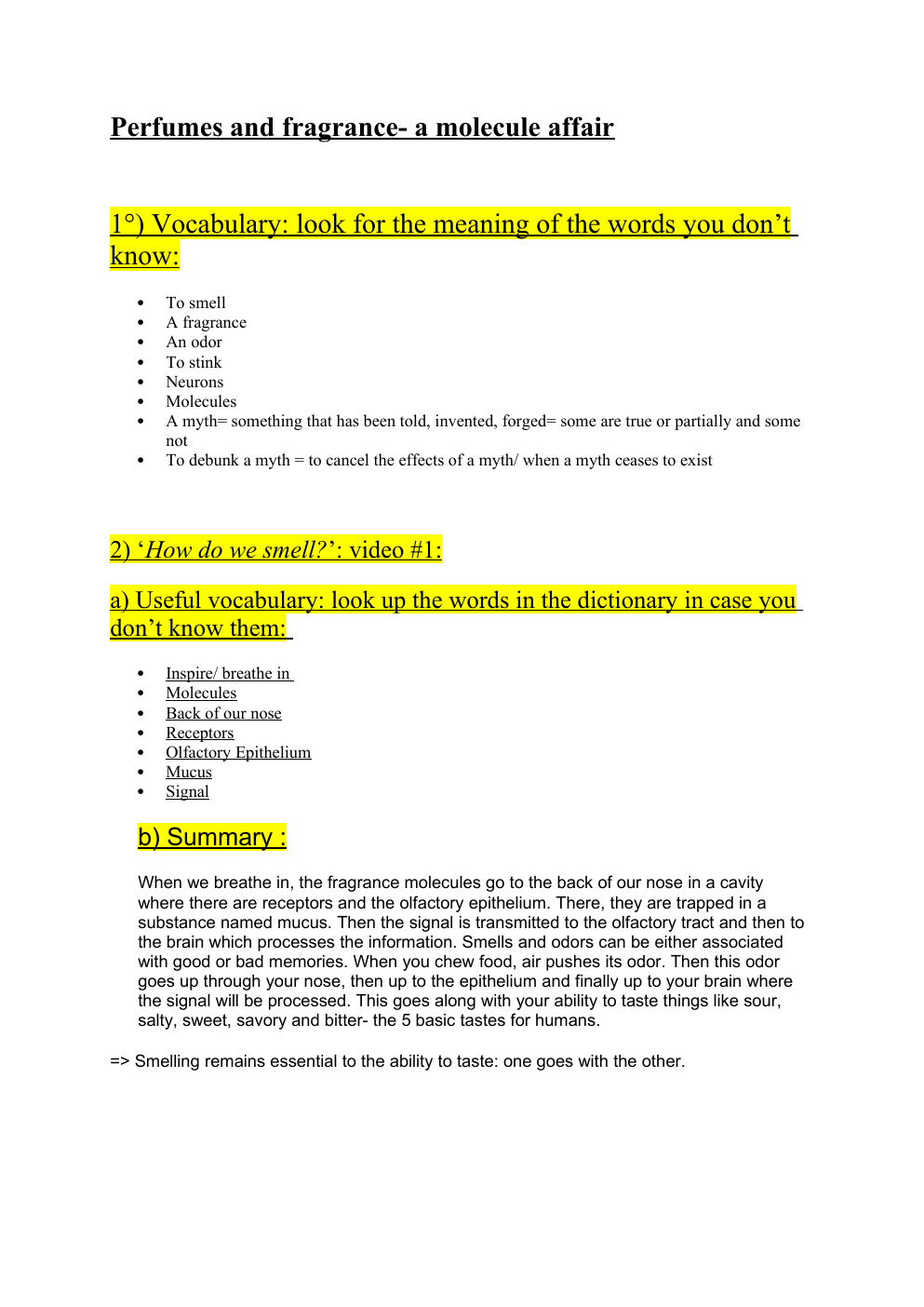Perfumes and fragrance- a molecule affair
Publié le 27/02/2024
Extrait du document
«
Perfumes and fragrance- a molecule affair
1°) Vocabulary: look for the meaning of the words you don’t
know:
To smell
A fragrance
An odor
To stink
Neurons
Molecules
A myth= something that has been told, invented, forged= some are true or partially and some
not
To debunk a myth = to cancel the effects of a myth/ when a myth ceases to exist
2) ‘How do we smell?’: video #1:
a) Useful vocabulary: look up the words in the dictionary in case you
don’t know them:
Inspire/ breathe in
Molecules
Back of our nose
Receptors
Olfactory Epithelium
Mucus
Signal
b) Summary :
When we breathe in, the fragrance molecules go to the back of our nose in a cavity
where there are receptors and the olfactory epithelium.
There, they are trapped in a
substance named mucus.
Then the signal is transmitted to the olfactory tract and then to
the brain which processes the information.
Smells and odors can be either associated
with good or bad memories.
When you chew food, air pushes its odor.
Then this odor
goes up through your nose, then up to the epithelium and finally up to your brain where
the signal will be processed.
This goes along with your ability to taste things like sour,
salty, sweet, savory and bitter- the 5 basic tastes for humans.
=> Smelling remains essential to the ability to taste: one goes with the other.
3) ‘Certain smells take you back to your childhood’ from the
healthsite.com:
1°) True / False
a) Scientists know nothing about the link
between smells and memories.
T / F=> F
b) The brain stores memories associated with
smells for decades.
T / F=> T
c) The researcher is from a university in
Germany.
T / F=> T
d) The researcher wants to know how the brain
stores long-term memories.
T / F => T
e) The article says there are many smells that
remind us of our childhood.
T / F +> T
f) Odours never make you wish you were back
in a moment in time.
T / F => F
g) Aromatherapists don't rely on smells with
their patients.
T / F More or less: it can be either
h) The article says stores use fragrances to make
shoppers walk faster.
T / F => F It is just to make you crave for something to buy
2°) Synonym Match
(The words in bold are from the news article.)
1.
Certain = particular
2.
recall =remember
3.
instantly = immediately
4.
encounters =meets
5.
temporarily =briefly
6.
Multitude= large number
7.
Scents= aromas
8.
escape = break free
9.
Association= connection
10.
Evoke= bring to mind
3°) Summary:
Smells are connected to memories and especially those dealing with sensations
and feelings.
It means that the association between memories and smells are quite quick- in
fact they bypass other part of the brain dedicated to abstract thinking.
Scent molecules bypass this and go directly to the olfactory bulb, and then the
hippocampus that normally handle emotions and sensations- and all the
memories connected to them.
No wonder it connects you to your early
sensational childhood memories.
Why? Probably to save from you from early
danger or on the contrary to ease you as if you were a child, innocent and pure.
In short the objective could be dual:
1) To defend you from potential dangers: you can recall smells that you
detected early in your life- before you were ten.
2) To give you self-support for the future- when you remember pleasant
smells (i.e.
cakes made by your grand ma, etc.)
.
Sujet sur le thème des parfums:
‘Scientists recreate perfume that could have been worn by
Cleopatra’, by Emma Day from the Nationalnews.com:
Vintagenews.com
1°) Describe a perfume: its composition, its history, its purpose.
This perfume is composed of a blend of cinnamon, myrrh, cardamon and olive
oil.
All this must be thicker than today’s perfume.
It has been discovered in Egypt.
People in ancient times used to use certain
products to get some benefits- especially health benefits: honey could fight
bacteria and olive oil could moisten you skin well.
Incense as well was
especially at fighting bacteria and only foul smell.
The purpose was twofold- to
fight off bacteria and to offer a rare luxury at that smell – to smell good.
2°)....
»
↓↓↓ APERÇU DU DOCUMENT ↓↓↓
Liens utiles
- Atom I INTRODUCTION Water Molecule A water molecule consists of an oxygen atom and two hydrogen atoms, which are attached at an angle of 105°.
- Ideology and Rationality in the History of the Life Sciences
- Relationship between religion, spirituality, and young Lebanese university students’ well-being.
- Course of reading and writing for 1st year English Licence
- dance and the different types of choreographie process


















